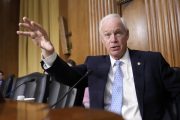
Lending Tree, the online lending marketplace, asked 2,040 American consumers in early September how they were doing. Seventy-six percent of them said that Bidenflation has made it more difficult than ever to pay their bills. Half of them said they have had to pay certain bills late in the last 12 months. That includes essentials like utility bills, mortgage payments, and cable or internet bills.
When pressed for the reason why, more than half of them answered, “I didn’t have enough money to pay the bill.”
The New American has diligently covered the decline in the economy, contrary to those in the mainstream media whistling past the graveyard. On September 10, we reported that the U.S. consumer was in deep trouble, according to a report from the New York Fed. But one had to dig deep into the numbers to find the truth.
The U.S. Census Bureau was slightly more forthcoming, reporting that nearly four out of 10 adults in the country were finding it “somewhat” or “very” difficult to pay their household expenses: food, gas, rent, insurance, healthcare, and so on.
The Administrative Office of the U.S. Courts couldn’t shade the truth: personal bankruptcy filings have jumped more than 15 percent this year over last, while bankruptcies of small businesses — the backbone of the U.S. economy — increased by more than 40 percent year over year.
An Unbiased Report
The Economic Times, published in India in the English language, is insulated from political correctness. It revealed that even in the high-tech sector, companies like IBM, GoPro, Apple, and Dell have been laying off workers at an accelerating rate: more than 136,000 since the first of the year.
Michael Snyder, editor of The Economic Collapse blog, wrote just weeks ago that Americans are getting hit with a double whammy: increased costs of living on a paycheck that has decreased in purchasing power. The cost of gas was up 46 percent; electricity, 31 percent; groceries, 22 percent; and car insurance, 55 percent!
Even the Beige Book, a snapshot of the U.S. economy published every six weeks by the New York Fed, revealed the extent of the damage in its latest report. Nine of the 12 Federal Reserve districts reported a slowing economy, up from just five in its previous report.
We reported on October 1 that the manufacturing sector of the U.S. economy contracted again in September. This caught the attention of Moody’s chief business officer, Chris Williamson, who noted:
The September PMI [Purchasing Managers’ Index] survey brings a whole slew of disappointing economic indicators regarding the health of the US economy.
Understatement of the Year
Now comes news from RealClearMarkets (RCM), reporting on its Economic Optimism Index, that there’s precious little optimism to be reported. The index has remained in negative territory for 38 consecutive months. RCM also reported, not surprisingly, that its Financial-Related Stress Index worsened again in September. It reported that “Americans are experiencing approximately 13% higher financial stress levels than usual.” That might qualify for the understatement of the year.
RCM noted at the end of its report that 84 percent of Americans are worried about inflation continuing to eat away at the purchasing power of the paychecks. Eighty percent are “concerned” about an economic slowdown in the next 12 months. Half of those surveyed think the U.S. economy is already in a recession.
The next day, Forbes magazine revealed that the American auto industry is having its own problems. This isn’t a surprise. Retail sales of new vehicles are essentially flat for the year despite auto prices coming down. And repossessions of those new cars, due to loan defaults, are up 23 percent so far this year.
Juicing the Economy Isn’t Working
With the presidential election less than a month away, it is clear that efforts by the Federal Reserve to juice the economy to help elect Marxist Kamala Harris aren’t working. Americans fed up with being forced to deal with this declining economy will recognize who is to blame, and vote for the other fellow in November.




